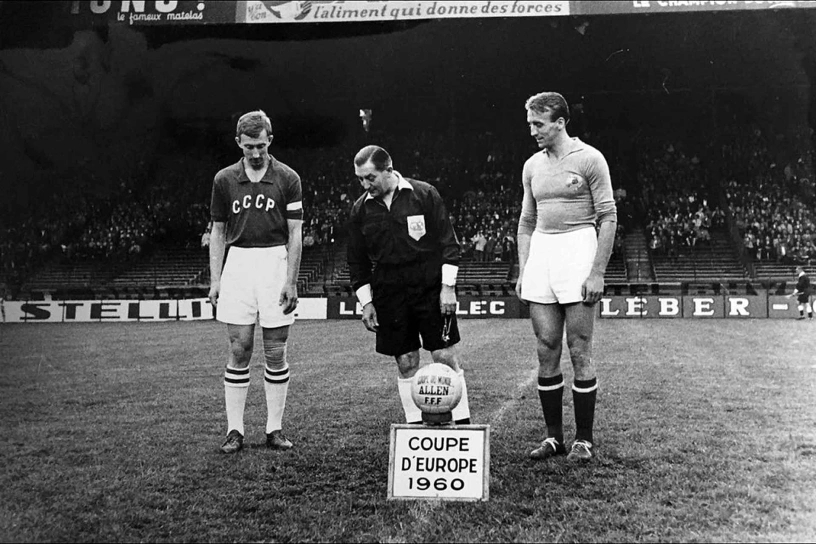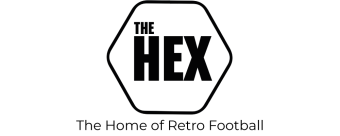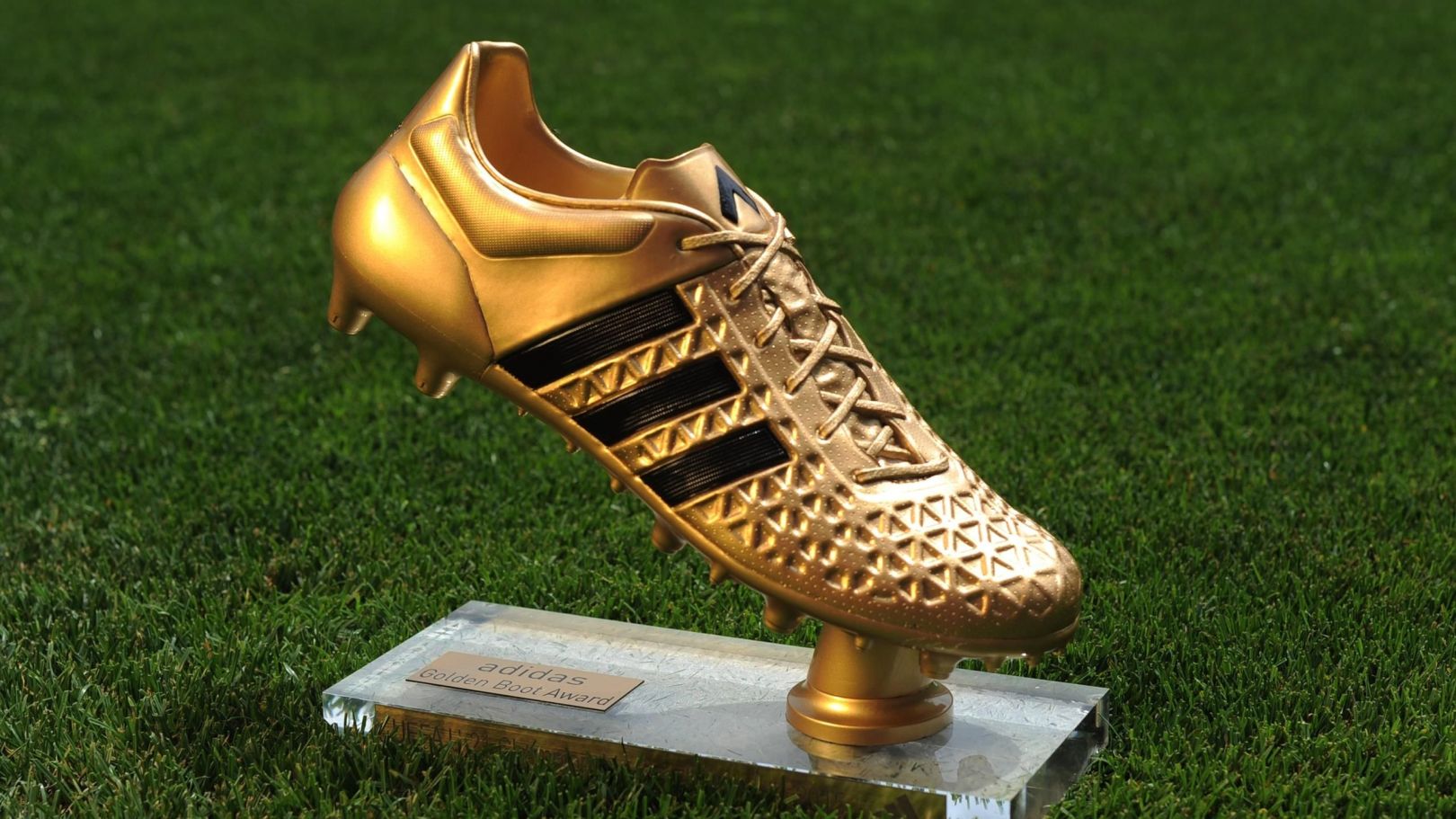The UEFA European Championship, steeped in tradition and excellence, has witnessed the rise of numerous footballing legends who etched their names in history as Golden Boot winners. Let’s embark on a journey through each tournament, celebrating the remarkable goal-scoring feats that have defined the European Championships over the years.
1960: Valentin Ivanov & Viktor Ponedelnik (Soviet Union) Milan Galić & Dražan Jerković (Yugoslavia) François Heutte (France) – 2 GOALS

The inaugural European Championship of 1960 was made up of just four teams competing for the European crown. The world was introduced to Valentin Ivanov and Viktor Ponedelnik whose four goals between them helped the Soviet Union win the first European Championship. Runners up, Yugoslavia also had goalscoring talent in the from of Galić and Jerković who both scored a brace a piece also. All four players shared the Golden boot alongside Frenchman Heutte who netted two goals for the host nation.
1964: Chus Pereda (Spain), Ferenc Bene & Dezső Novák (Hungary) – 2 GOALS
The 1964 tournament was again competed by just four teams and Spain’s Chus Pereda helped the Spaniards to victory with his two tournament goals for the host nation. Hungary’s Ferenc Bene and Dezső Novák finished as joint Golden Boot winners, each scoring two goals a piece.
1968: Dragan Džajić (Yugoslavia) – 2 GOALS
The 1968 European Championship was a low scoring tournament with just 7 goals in five games. However, the tournament did showcased the brilliance of Dragan Džajić, whose two goals for Yugoslavia earned him the Golden Boot and solidified his status as one of the finest goal scorers of his generation. He helped his side to the final but they couldn’t overcome host nation Italy.
1972: Gerd Müller (West Germany) – 4 GOALS

Gerd Müller’s four goals in the 1972 European Championship propelled West Germany to victory and cemented his status as a legendary goal scorer. Müller’s instinctive ability to find the back of the net in crucial moments proved decisive, earning him the Golden Boot and etching his name in footballing folklore as ‘Der Bomber’.
1976: Dieter Müller (West Germany) – 4 GOALS
Step aside ‘Der Bomber’, namesake Dieter Müller earned the Golden Boot in the 1976 European Championship with a hat-trick in the semi-final for West Germany and one in the final but that wasn’t enough to retain the European title for the Germans as they lost on penalties to Czechoslovakia, and the Panenka was born!
1980: Klaus Allofs (West Germany) – 3 GOALS
The tournament was expanded to 8 teams in 1980 and it was the Germans once again who topped the goal scoring chart with Klaus Allofs bagging three goals as they went on to lift the European Championship for the second time. The golden boot winner Allofs prowess and knack for scoring in decisive moments epitomised the spirit of champions as he grabbed a hat-trick against the Netherlands to seal a vital 3-2 victory in the group stages.
1984: Michel Platini (France) – 9 GOALS

Michel Platini’s mesmerizing performances in the 1984 European Championship captivated the footballing world as he scored an unprecedented nine goals to claim the Golden Boot. Platini’s elegance, vision, and clinical finishing elevated him to legendary status and inspired a generation of footballers. ‘Le Roi’ inspired the host nation to their first European Championship title.
1988: Marco Van Basten (Netherlands) – 5 GOALS
Marco van Basten’s five goals in the 1988 European Championship showcased his sublime skill and lethal finishing, earning him the Golden Boot and guiding the Netherlands to victory in a memorable final against the Soviet Union. Van Basten’s iconic volley in the final remains etched in footballing history as one of the greatest goals of all time.
1992: Tomas Brolin (Sweden), Henrik Larsen (Denmark) Karl-Heinz Riedle (Germany) Dennis Bergkamp (Netherlands) – 3 GOALS
The host team star striker Tomas Brolin bagged three goals for Sweden but he couldn’t get them to the final after they suffered defeat to European powerhouse Germany, with a brace from striker Karl-Heinz Riedle. Dutch superstar Dennis Bergkamp also netted three goals but it was the exploits of Danish midfielder Henrik Larsen who caught the eye as he helped Denmark to their first title with three goals from midfield.
1996: Alan Shearer (England) – 5 GOALS

The tournament in 1996 was again increased from 8 teams to 16 teams and Alan Shearer’s five goals for England in the 1996 European Championship earned him the Golden Boot and showcased his predatory instincts in front of goal. Shearer’s performances electrified the tournament, providing a beacon of hope for English football. It almost came home but it was the Germans that eventually landed their third title.
2000: Savo Milošević (Yugoslavia), Patrick Kluivert (Netherlands) – 5 GOALS
Savo Milošević scored in every one of Yugoslavia’s four matches at EURO 2000 but he couldn’t prevent his team suffering a heavy defeat to host nation Holland in the Quarter finals. Talented Dutch talisman Patrick Kluivert scored a hat-trick to seal a 6-1 victory over Savo’s Yugoslavia but that would be the last goal he scored in the tournament also after they lost in the semi-finals to Italy.
2004: Milan Baroš (Czech Republic) – 5 GOALS

Milan Baroš’s five goals for the Czech Republic in the 2004 European Championship announced his arrival as one of the most promising young talents in European football. Baroš’s explosive pace and clinical finishing showcased his potential, earning him the Golden Boot and leaving a lasting impact on the tournament.
2008: David Villa (Spain) – 4 GOALS
David Villa’s four goals for Spain in the 2008 European Championship earned him the Golden Boot and he played a pivotal role in guiding his team out of the group stages and eventually to victory for the second time in their history. Villa’s clinical finishing and ability to rise to the occasion in decisive moments epitomised the spirit of champions.
2012: Mario Mandžukić (Croatia), Mario Gomez (Germany), Mario Balotelli (Italy), Cristiano Ronaldo (Portugal), Fernando Torres (Spain) and Alan Dzagoev (Russia) – 3 GOALS
The tiki-taka football showcased by the Spanish was unplayable in 2012 as they romped to a third title in Poland / Ukraine with Fernando Torres scoring three goals for Spain. However, he didn’t top the scoring charts with five others scoring 3 goals for their nation during the tournament including goal machine Cristiano Ronaldo from Portugal who would go on to lift the Golden Boot in years to come.
2016: Antoine Griezmann (France) – SIX GOALS

The number of teams in participating in the tournament jumped once again from 16 teams to 24 but it turned out to be Les Blues, Antoine Griezmann’s defining moment in his career, as he emerged as the tournament’s top scorer with six goals, earning him the prestigious Golden Boot. His remarkable display of skill and consistency was instrumental in leading France to the final, although they ultimately lost to Portugal. Griezmann’s goals were crucial in the knockout stages, including a brace against Ireland in the Round of 16 and another two goals in the semi-final against Germany. This tournament cemented his reputation as one of the world’s elite forwards and significantly boosted his profile, leading to further success at both the club and international levels.
2020: Cristiano Ronaldo (Portugal), Patrik Schick (Czech Republic) – 5 GOALS
The Golden Boot winner for the UEFA Euro 2020 tournament (played in 2021 due to COVID-19) was Cristiano Ronaldo of Portugal. He scored a total of five goals during the tournament and provided one assist, which helped him win the award over other players who also scored five goals due to the assist and fewer minutes played. Patrick Schick of the Czech Republic also scored five goals in the UEFA Euro 2020 tournament, tying with Cristiano Ronaldo for the highest number of goals. However, Ronaldo won the Golden Boot due to having one assist, while Schick had none.
Who will get the Golden Boot in 2024, answers on a postcard!

SHOP the official England retro collection at 3Retro.com

